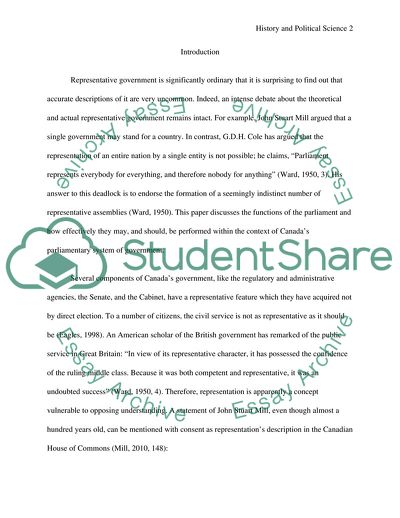Cite this document
(The Canadian Parliament - Its Role and Reforms Case Study Example | Topics and Well Written Essays - 3000 words, n.d.)
The Canadian Parliament - Its Role and Reforms Case Study Example | Topics and Well Written Essays - 3000 words. https://studentshare.org/politics/1756524-critically-analyze-the-functions-of-parliament-and-how-effectively-they-may-and-should-be-performed-within-the-context-of-canadas-parliamentary-system-of-government-what-reforms-would-you-suggest-might-be-a-practical-means-to-foster-a-more-effective
The Canadian Parliament - Its Role and Reforms Case Study Example | Topics and Well Written Essays - 3000 words. https://studentshare.org/politics/1756524-critically-analyze-the-functions-of-parliament-and-how-effectively-they-may-and-should-be-performed-within-the-context-of-canadas-parliamentary-system-of-government-what-reforms-would-you-suggest-might-be-a-practical-means-to-foster-a-more-effective
(The Canadian Parliament - Its Role and Reforms Case Study Example | Topics and Well Written Essays - 3000 Words)
The Canadian Parliament - Its Role and Reforms Case Study Example | Topics and Well Written Essays - 3000 Words. https://studentshare.org/politics/1756524-critically-analyze-the-functions-of-parliament-and-how-effectively-they-may-and-should-be-performed-within-the-context-of-canadas-parliamentary-system-of-government-what-reforms-would-you-suggest-might-be-a-practical-means-to-foster-a-more-effective.
The Canadian Parliament - Its Role and Reforms Case Study Example | Topics and Well Written Essays - 3000 Words. https://studentshare.org/politics/1756524-critically-analyze-the-functions-of-parliament-and-how-effectively-they-may-and-should-be-performed-within-the-context-of-canadas-parliamentary-system-of-government-what-reforms-would-you-suggest-might-be-a-practical-means-to-foster-a-more-effective.
“The Canadian Parliament - Its Role and Reforms Case Study Example | Topics and Well Written Essays - 3000 Words”. https://studentshare.org/politics/1756524-critically-analyze-the-functions-of-parliament-and-how-effectively-they-may-and-should-be-performed-within-the-context-of-canadas-parliamentary-system-of-government-what-reforms-would-you-suggest-might-be-a-practical-means-to-foster-a-more-effective.


